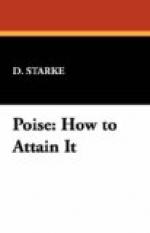One should begin with this fundamental principle:
Timidity being a disease one must treat it just as one would any other illness.
Like all other physical maladies it is sure to be the cause of loss of social prestige to those who suffer from it.
It must then be combated in the same way as any other infirmity of long standing that threatens to ruin the life of the sufferer.
It is a grave mistake to consider it merely a mental ailment that can be alleviated by nothing but psychological treatment.
One’s nervous condition plays a very large part in the conquest of poise.
We must, therefore, watch most carefully over the good health of the body before taking any measures whatever to abolish a condition of affairs that has been engendered by physical weakness and that will be fostered by it unless such weakness can be eradicated or more or less dissipated and ameliorated by a thousand little daily acts of care.
It must be understood that we are not now speaking of medical treatment. We have reference merely to that common-sense hygiene which has become more or less a part of modern existence, and the daily practise of which, while firmly establishing the health, has at the same time an undoubted reflex action upon the mind. It is a well-known fact that energy is never found in a weakened body, and that people who are suffering are clearly marked down to become the prey of those wasting diseases, whose names, all more or less fantastic, may be classed as a whole under the general heading of “nervous maladies.”
To enumerate them is superfluous and unnecessary. Lack of poise gives rise to all sorts of weaknesses, which are given the names of nervous diseases and finally become classed in the category of phobias, of which the starting-point is always a habit of fear due to excess of timidity. This morbid disposition is the parent of a continual apprehensiveness which is shown upon all sorts of occasions.
The man who has the space phobia is quite unable to cross an open space unless he is supported or, at the very least, accompanied.
Claustrophobia is the malady of those who have a horror of close quarters from which they can not easily make their escape.
Writers’ cramp is nothing in the world but one of these exaggerated nervous terrors.
Erythrophobia, that is to say the habit of inopportune and constant blushing, is another of the commonest forms of excessive timidity.
Stammering is another of the tortures that people of poise do not experience, except in those cases where it is caused by a physical malformation.
All these maladies attack only the timid.
There are many others, less serious in their nature, such as indecision, exaggerated scrupulousness, extreme pliability, hypochondria. All of these should be ruthlessly supprest the moment we become aware of them, for they are one and all the forerunners of that mentally diseased condition which gives rise to the phobias of which we have just been speaking.




